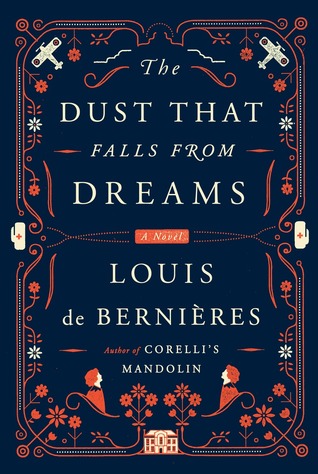 I picked this book up at the library because, quite frankly, that is one of the loveliest titles I've seen in a while. The Dust That Falls From Dreams... There's just something incredibly romantic about it, don't you think? That, and because when I read the flap, I saw that the story takes place in the years of and surrounding World War I, which I think is an underrepresented conflict in historical fiction given its impact on the world. World War II has tons of historical fiction surrounding it, but I see much less taking place during WWI.
I picked this book up at the library because, quite frankly, that is one of the loveliest titles I've seen in a while. The Dust That Falls From Dreams... There's just something incredibly romantic about it, don't you think? That, and because when I read the flap, I saw that the story takes place in the years of and surrounding World War I, which I think is an underrepresented conflict in historical fiction given its impact on the world. World War II has tons of historical fiction surrounding it, but I see much less taking place during WWI.The story here is definitely character-driven, following the McCosh family, particularly the eldest daughter Rosie, through the years before, during, and after the war. Before the war, Rosie and her sisters are friends with the boys who live on either side of them, forming a large group called "the Pals." Rosie and Ashbridge, the eldest Pendennis boy, are very close and become engage (formally; they were informally engaged since Rosie was twelve) right before Ash goes off to fight in France with his brothers. From a very early time, we know that Ash is doomed, and can see the consequences of this looming up for Rosie. Rosie and her sisters eventually take up wartime occupations, their mother witnesses a tragedy, and their father opens a number of new ventures. Meanwhile, Daniel Pitt, one of the boys from the other side of the fence, becomes an ace pilot.
Because this is a character-driven story, there's not really a plot. It's more about watching as Rosie, because she is definitely the main character, develops. Rosie can be extremely frustrating at times, especially to a reader who (like me) isn't particularly religious. Rosie is very religious, and while I could see why she was so, the degree to which she clung to her beliefs could be absolutely infuriating. She has a tendency to ruin her own happiness, as well as that of others, because she clings to her faith so strongly, even when other parts of her religion--and religious figures such as Fairhead the chaplain--tell her that it's okay to move on. Daniel was an utter saint for putting up with her, and if I had been his mother, I probably would have smacked Rosie upside the head for the way she behaved toward him. That said, I still liked Rosie, quite a bit. Her frustrating qualities were greatly balanced by her overwhelming goodness. She's just so nice that you can't help but like her. And it's not an infuriating or fake niceness, because she has her angry moments--she throws a Wedgewood vase at someone at one point--but because she's genuinely a good soul.
Daniel was, by far, my favorite character; his charm, his quirks, everything about him was good. His doubts, both in himself and in his country, are genuine, but he still does his duty because he feels it's the right thing to do, and perseveres in his relationship with Rosie because he does love her, even when it doesn't seem like she cares about him in return. He's really better than she deserves at many points, but holds out.
The supporting characters were also, for the most part, delightful. I would have liked to see a few more of their plots tied up, though--at the end, several people are just left hanging. Rosie and Daniel's plot wound up fairly nicely. Everything was pretty much resolved in regards to them, or at least it was suggested that everything was. But for Ottilie, Mr. McCosh, and Archie (who I would have liked to see more of in general) things were left somewhat hanging. It felt like de Bernieres almost created too many characters, and then decided he couldn't have plots for all of them, and so focused in on a few, ignored a few, killed a few, and sent a few off to distant locales so he wouldn't have to deal with them.
This book also got off to what I felt was a very slow start--but once the war started, I liked it more. The pace picked up, the characters became more interesting, and the story itself became more complex. I have mixed feelings about how the non-narrative chapters were written; journal entries and letters have never been my favorite ways of portraying or reading action in books. However, they do fit the time period and theme of how war affects people, so I suppose they were all right. They got fewer and farther between later in the book, which I appreciated; the plain narrative chapters definitely suited me more.
Overall, though, I quite liked this book; I feel like it's a solid 3.5 to 4 stars for its overall art and portrayal of a somewhat underrepresented turbulent time on the global stage, while focusing in on that times' effects on a small group of people who are still somewhat representative of the whole.
No comments:
Post a Comment